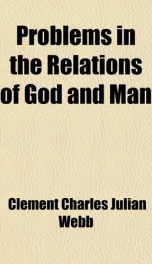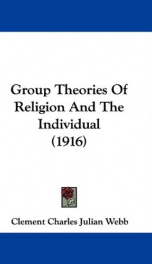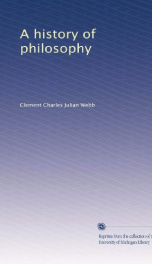problems in the relations of god and man

Purchase of this book includes free trial access to www.million-books.com where you can read more than a million books for free. This is an OCR edition with typos. Excerpt from book: CHAPTER III RELIGION AND RELIGIONS : RATIONALISM AND SENTIMENT ALISM "DEFORE leaving the first of our three problems, --' that of Reason and Revelation, I propose to offer some brief observations on two points which have been raised in the course of our discussions, and to say no more at all of which would seem to leave our treatment of the problem glaringly incomplete. Yet either of them, if discussed with the fullness which it deserves, would carry us far beyond that problem in the form in which we have undertaken to examine it. Here, therefore, as in my preliminary observations, I shall be occupied chiefly in stating a position, without pretending to supply an adequate justification of it. 1. The first of these points is the relation of Religion to Religions. We have seen that the question of this relation presented itself as a difficulty at the outset of my discussion of the Philosophy of Religion; and later on, that it was desirable to distinguish (on lines which, though not quite the same, roughly corresponded with those of the traditional distinction between Natural and Revealed Religion) betweenwhat, in the religions of the world, is amenable to general treatment, the ideas, that is, implied in religious practices or expressed in religious doctrines, and what belongs to the historical context of particular religions, and varied from one to another. About this historical element we noted two things : one, that, contrary to what one might perhaps have expected, an insistence on the importance of the historical element does not go with a lower, but rather with a higher type of religion; and the other, that this is perhaps not so surprising as it might at first seem, because, if in religion we have reached the highest form of experience, we should expect it to relate ...
Info about the book
Author:
Series:
Unknown
ASIN:
B008KSG4X6
Rating:
4.5/5 (4)Your rating:
0/5
Languge:
English
Users who have this book
Users who want this book
What readers are saying
What do you think? Write your own comment on this book!
write a commentif you like problems in the relations of god and man try:
Do you want to read a book that interests you? It’s EASY!
Create an account and send a request for reading to other users on the Webpage of the book!





